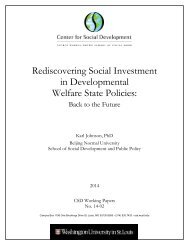Exploring and Assessing Intercultural Competence - Center for ...
Exploring and Assessing Intercultural Competence - Center for ...
Exploring and Assessing Intercultural Competence - Center for ...
You also want an ePaper? Increase the reach of your titles
YUMPU automatically turns print PDFs into web optimized ePapers that Google loves.
<strong>Exploring</strong> <strong>and</strong> <strong>Assessing</strong> <strong>Intercultural</strong> <strong>Competence</strong><br />
initial phase project that will be developed even more fully in a follow-on study. And, whereas<br />
this initial phase involved only three MOs, the full research ef<strong>for</strong>t will hopefully involve all<br />
member countries – diverse in languages <strong>and</strong> cultures, geographically widespread, <strong>and</strong><br />
spanning a timeframe of activity of up to 75 years (or, as long as each MO has maintained<br />
reliable alumni records).<br />
In this Initial Phase Project (IPA), the data sought were quantitative (statistics, collective<br />
profiles, etc.) <strong>and</strong> qualitative (open-ended comments, anecdotes, individual interviews, etc.).<br />
Combined data provided a rich source of in<strong>for</strong>mation about the research issues cited above <strong>and</strong><br />
other outcomes in terms of: the nature of intercultural competence, the identification of attributes<br />
<strong>for</strong> success in cross-cultural encounters, the degree of competence attained, the effects of the<br />
experience on participants’ ensuing careers <strong>and</strong> life choices <strong>and</strong>, finally, participant<br />
contributions in turn to the overarching mission of the Federation. In addition, the project<br />
resulted in producing a more reliable instrument to measure <strong>and</strong> monitor intercultural<br />
development during <strong>and</strong> beyond a participant’s sojourn.<br />
Given this ambitious long-term plan <strong>for</strong> a worldwide research ef<strong>for</strong>t, the preliminary steps<br />
undertaken in this initial phase included: defining concepts, developing survey questionnaires,<br />
<strong>and</strong> several limited focus studies (cf. e.g., Hovey 2001). The results obtained from these will all<br />
help in<strong>for</strong>m MOs in areas of marketing, program design, criteria <strong>for</strong> participant selection, criteria<br />
<strong>for</strong> intercultural success, improved assessment, etc., resulting in administrative <strong>and</strong> educational<br />
improvements. Given FEIL’s approaching 75 th anniversary, to be celebrated on an international<br />
scale in May 2007 in Berlin, Germany, this endeavor seemed both timely <strong>and</strong> appropriate at this<br />
moment in our history.<br />
2. Theoretical Perspectives<br />
The challenge of any project of this type is to <strong>for</strong>mulate the basic concepts on which the entire<br />
ef<strong>for</strong>t was based – e.g., what exactly is “intercultural competence”? <strong>and</strong> how do we best measure<br />
<strong>and</strong> monitor it? Our starting point, then, was to return to an earlier notion of “communicative<br />
competence,” a term first advanced in language education (<strong>and</strong> rein<strong>for</strong>ced through other<br />
disciplines) over 25 years ago. Various abilities had been posited that comprise this competence,<br />
developed so early in life. Everyone develops the communicative competence that <strong>for</strong>ms part of<br />
their native language <strong>and</strong> cultural system (CC1), while those entering additional language-culture<br />
systems at any other time thereafter, potentially develop a second system (CC2), or even<br />
additional systems (CC3, CC4),, <strong>and</strong> so on. But once the initial system is fairly well established by<br />
around puberty (reflecting <strong>and</strong> affecting one’s view of the world), it becomes increasingly<br />
difficult to see things any other way – hence, the power of the intercultural sojourn in providing a<br />
chance at seeing things “anew.”<br />
To transcend one’s native CC1 (<strong>and</strong> worldview) <strong>and</strong> enter into an alternative system (CC2), to any<br />
degree, then, requires the concurrent development of “intercultural” communicative<br />
competence (aka: intercultural competence, or ICC). To do this, however, dem<strong>and</strong>s nothing<br />
less than reconfiguring one’s original worldview (or better put, “transcending <strong>and</strong> trans<strong>for</strong>ming”<br />
it). ICC, then, is more than a collection of abilities that allow one to function in one <strong>and</strong> another<br />
system (CC1 <strong>and</strong> CC2); ICC also results in producing unique perspectives that arise from<br />
interaction of two (or more) systems. Indeed, ICC is part <strong>and</strong> parcel of developing bilingualbicultural<br />
(or multilingual-multicultural) perspectives; perspectives that no monolingualmonocultural<br />
individual of either of the two individual systems can ever possibly have.<br />
<strong>Center</strong> <strong>for</strong> Social Development<br />
Washington University in St. Louis<br />
8
















